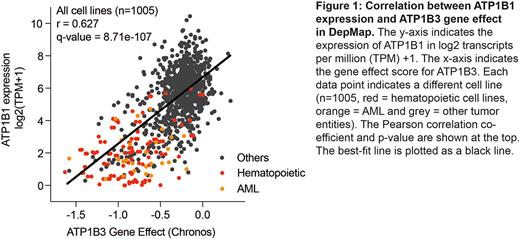Abstract
Acute myeloid leukemia (AML) is a heterogenous hematologic malignancy with poor overall survival despite intensive cytotoxic chemotherapy and newer targeted agents. With a 5-year survival rate of only 30% in adults with AML, new therapeutic strategies are needed. Tissue-specific differences in the expression of paralog genes, which are not essential in most cell types due to the buffering effect of the partner pair, could make for highly selective gene dependencies. To identify novel, selective paralogous targets for AML, we integrated the Cancer Dependency Map, which provides genome-scale CRISPR/Cas9 depletion screening data in hundreds of cancer cell lines, with numerous databases characterizing protein-protein interactions, paralog relationships, and gene expression in cancer models. Here, we identified ATP1B3 as a context-specific, paralog related dependency in AML.
ATP1B3 is the smaller glycoprotein beta subunit of the sodium-potassium pump (Na/K-ATP pump). Together with the catalytic alpha subunit ATP1A1, it forms a heterodimer located in the plasma membrane, regulating the electrochemical gradient through the transport of Na and K ions across the membrane. The Na/K-ATP pump is of vital importance in the maintenance of cellular homeostasis and membrane potential. While ATP1A1 carries out the ion transport and enzymatic activity, making it a common essential gene (a gene which ranks among the most depleted genes in at least 90% of screened cell lines), ATP1B3 is not essential in most cancer cells. The beta subunit is important for intracellular transport and stabilization of the alpha subunit in the membrane, but it has three paralogs: ATP1B3 showing similar expression patterns across tissues, ATP1B2 exclusively expressed in brain and retina, and ATP1B1 showing differential expression across tissues. ATP1B1 has uniformly low expression in hematological malignancies and low ATP1B1 expression is the strongest predictor of ATP1B3 dependency (Figure 1).
Using CRISPR/Cas9 knockout and competitive growth assays, we showed that knockout of ATP1B3 in ATP1B1 low-expressing AML cells indeed leads to synthetic lethality. Knockout of ATP1B3 significantly decreased number and size of colonies in a patient-derived xenograft (PDX) model of AML to a similar degree as the knockout of the common essential gene ATP1A1. Moreover, in these AML models, the absence of both paralogs of the beta subunit resulted in the destabilization of their binding partner ATP1A1. In contrast, expression of ATP1B1 stabilized ATP1A1 despite ATP1B3 knockout in solid tumors and in ATP1B1-overexpressing AML cells. In vivo, using an orthotopic AML cell line mouse model and an AML PDX model, ATP1B3 knockout resulted in lower leukemia burden in comparison to ATP1B1 knockout or a non-targeting control guide. To determine if ATP1B1 and ATP1B3 share primarily redundant functions, we utilized BioID (proximity-dependent biotin identification) to identify their interaction partners. We discovered that in AML, there is significant overlap of the ATP1B1 and ATP1B3 binding partners, and ATP1A1 is among the strongest. Enrichment of gene sets involved in protein folding in the endoplasmic reticulum are also consistent with the important role of the beta subunits in proper ATP1A1 folding and stabilization.
Taken together, we identified ATP1B3 as a selective dependency in AML. We propose that when ATP1B1 is poorly expressed, elimination of ATP1B3 leads to the destabilization of the sodium-potassium pump including ATP1A1. ATP1B3 is a potential tumor-selective therapeutic target for AML and other hematologic malignancies with low expression of ATP1B1.
Disclosures
Dharia:Genentech, Inc., member of the Roche Group: Current Employment, Current equity holder in publicly-traded company. Oellerich:F. Hoffmann-La Roche Ltd: Consultancy, Honoraria; Merck KGaA: Consultancy, Research Funding; Gilead Sciences, Inc.: Research Funding. Stegmaier:AstraZeneca: Consultancy; Auron Therapeutics: Consultancy, Current holder of stock options in a privately-held company, Membership on an entity's Board of Directors or advisory committees; Novartis: Research Funding; KronosBio: Consultancy, Research Funding.
Author notes
Asterisk with author names denotes non-ASH members.


This feature is available to Subscribers Only
Sign In or Create an Account Close Modal